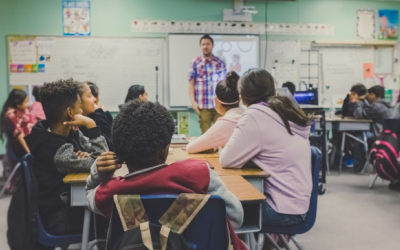You are here
- Home
- Leading online learning: Out of crisis comes opportunity
Leading online learning: Out of crisis comes opportunity

We are just entering the pilot stage of our research project which looks at how schools have strategically managed online learning during Covid, and if and how, new experiences during lockdown have created long term sustainable changes in relation to the way education is managed and delivered. One of our key research questions investigates whether changes and new ways of doing things, implemented during Covid, are going to have a long-term effect on schools’ vision of education to come.
It is undisputed, that Covid has had a massive impact on education and the way it is delivered, both in the UK and internationally. Whilst there have been a number of papers on the ways in which teachers have innovated during this time, and the impact this has had on their workload and mental health, there has been little on how school leaders and their senior teams have taken a strategic overview of online and blended learning.
This is an important are to explore for several reasons: The first relates to the introduction of a more intensive regime of online teaching, one that has been forced on schools, unusually not by government, but by circumstance. The way that this has taken place, without preparation, training, or any sort of upgrade to school infrastructure, is in itself fascinating: not only in relation to the challenges that schools have faced and how they have dealt with them, but equally, the opportunity that such change presents. Schools are used to a raft of policy innovation: changes to their practices, procedures, and to the very nature of education: Policies imposed by successive governments, each more eager than the last to prove that they can close that elusive achievement gap, that for many years has proved intractable in the face of policy innovation, and inimical to social mobility, particularly in class dominated England (Weis and Dolby, 2012). The second, is in relation to the way that schools have worked with parents and carers to ensure provision during these the most testing times (Jewitt et al., 2021).
Since the Academy Act of 2010 schools have become increasingly distant from their communities (Baxter and Cornforth, 2019). This is particularly true of Multi-Academy trusts-groups of schools managed by boards and CEOs- that research has illustrated, are often remote and out of touch with school communities (Greany and Higham, 2018). Increasingly standardised practice of teaching, pedagogy and curriculum, imposed across what have become vast multilevel organisations, has created a new educational landscape within what is often termed, ‘the system less system of English education’(Lawn, 2013). The third reason why our approach potentially rich, is in relation to the long-term sustainability of good practices brought about by the pandemic. Certainly, one of its by products, is that it has revealed the stark reality of successive financial cuts to education that have been brought about by government, particularly since 2010 (Gray and Barford, 2018): Covid has brought this into the public eye, in such a way as to make it almost impossible for government to ignore. Shortages of hardware, weaknesses in school infrastructure, and last but by no means least, the chronic shortage of food experienced by many families living on and below the breadline, have been headline news since the pandemic began.
These factors have created a unique environment (all albeit a very testing one), for school leaders and their senior teams. Stripped bare of the usual rounds of consultation before introduction of new policies and practices, school leaders and their teams have had to innovate and create, in order to provide the impetus needed to steer schools and their learners through stormy waters.
It is said that the only real change in society emerges at times of crisis, According to the free market fundamentalist Milton freedman, ‘Only a crisis – actual or perceived – produces real change. When that crisis occurs, the actions that are taken depend on the ideas that are lying around.’ Covid has and is, along with climate change, one of the most pressing issues of our time. It seems impossible to imagine that education can emerge from this to the ‘same old, same old.’ Our initial interviews with school leaders have started to reveal some of the new; certainly there is evidence of huge progress even in the short time between lockdown in early 2020, and the one in which we find ourselves at present. Echoing an ancient quote on action during crisis:
You start by doing what is necessary; then do what’s possible; and suddenly you are doing the impossible.
St Francis of Assisi
Similarly, our project will investigate the necessary, look at the innovations of the possible, and finally, point to how the seemingly impossible may profoundly change education and the way we deliver it.
Our pilot report will launch in late April, followed by our interim policy briefing in June.
Publications
- Baxter JA and Cornforth C. (2019) Governing collaborations: how boards engage with their communities in multi-academy trusts in England. Public Management Review: 1-23.
- Gray M and Barford A. (2018) The depths of the cuts: the uneven geography of local government austerity. Cambridge journal of regions, economy and society 11: 541-563.
- Greany T and Higham R. (2018) Hierarchy, markets and networks: analysing the'self-improving school-led system'agenda in England and the implications for schools.
- Jewitt K, Baxter J and Floyd A. (2021) Literature review on the use of online and blended learning during Covid 19 and Beyond. The Open University The Open University
- Lawn M. (2013) A Systemless System. Forthcoming.
- Weis L and Dolby N. (2012) Social class and education: Global perspectives: Routledge.
Dr Jacqueline Baxter

Dr Jacqueline Baxter is Associate Professor in Public Policy and Management and Director for the Centre of Innovation in Online Business and Legal Education (SCILAB). She is Principal Fellow of The Higher Education Academy, Fellow of The Academy of Social Sciences and Elected Council Member of Belmas. She has been Editor in Chief of the Sage Journal Management in Education (MiE) for 4 years.
Her current funded research projects examine the interrelationship between trust, accountability and capacity in improving learning outcomes; and the strategic management of online learning in secondary schools during and beyond Covid19. Dr Baxter is based in The department of Public Leadership and Social Enterprise at The Open University Business School. Her latest book is: Trust, Accountability and Capacity in Education System Reform (Routledge, 2020).
Upcoming Events
No events